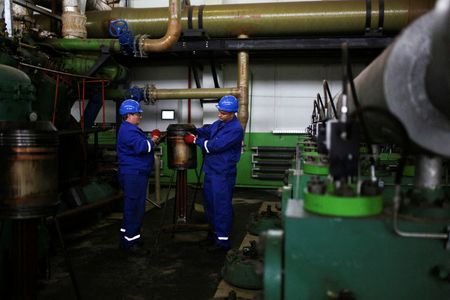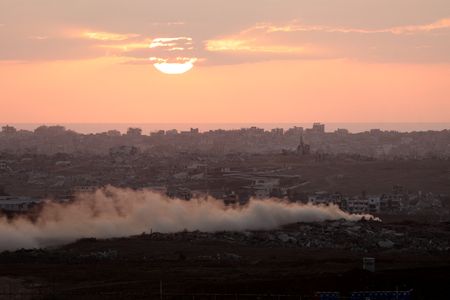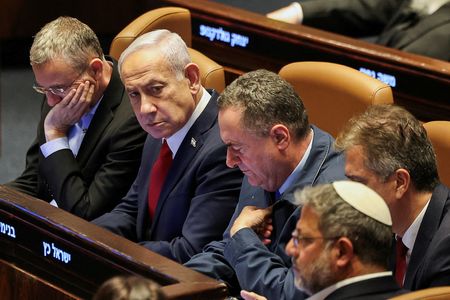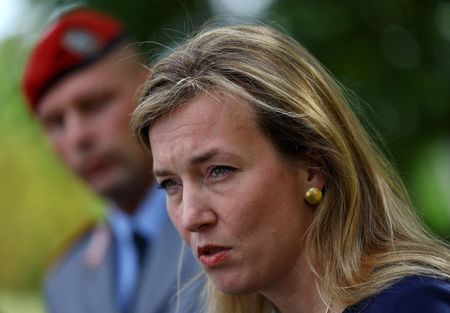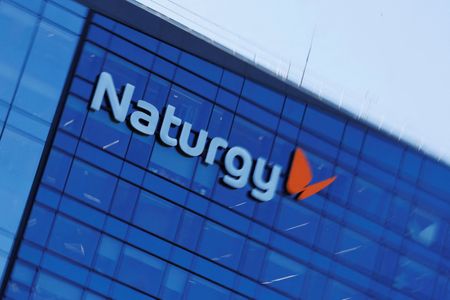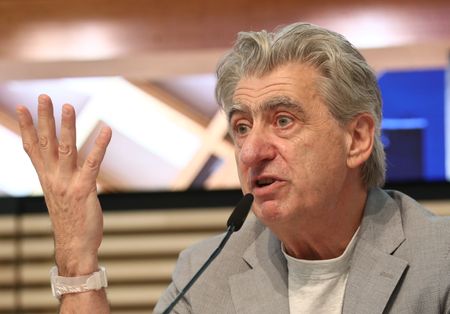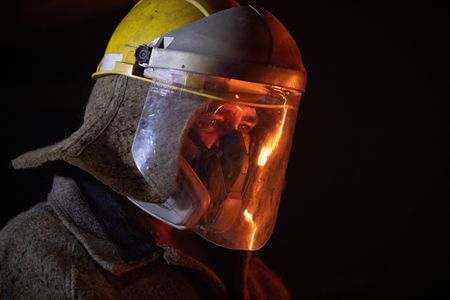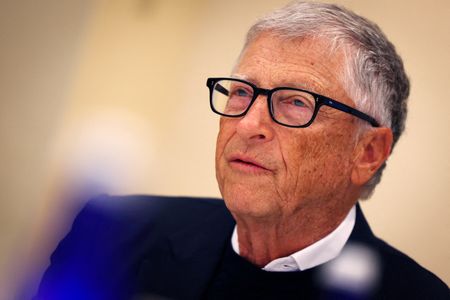By David Gauthier-Villars and Anna Hirtenstein
August 4 (Reuters) -Two American financiers, with support from a former campaign manager of U.S. President Donald Trump, have approached Bulgarian authorities to discuss a possible investment in a state-owned underground storage filled mostly with Russian natural gas, according to five people familiar with the matter.
Led by Stephen P. Lynch, a Florida financier who has been trying to buy a gas pipeline linking Russia to Germany, and another U.S. investor, Fei Wang, the group is considering ways to participate in a multi-million-euro government plan aimed at doubling the capacity of Bulgaria’s sole underground gas storage, known as Chiren, the people familiar with the matter said.
Allied with Brad Parscale, who worked on Trump’s 2016 and 2020 campaigns, the group would like to harness additional storage capacity at Chiren to transform Bulgaria into a gas hub serving parts of Eastern Europe, the people said.
Through a spokesperson, Lynch declined to comment for this article.
Storage sites are strategic assets in the gas industry, allowing operators to manage big seasonal swings in demand and capitalize on price fluctuations: buying gas when prices are low and releasing it when they are higher.
With or without U.S. investors, Chiren could play a critical role in the coming years as Greece, Serbia, Hungary, and other countries in Eastern Europe debate whether to keep buying gas from Russia or increase imports from other suppliers, including the United States.
Lynch and Wang are scheduled to meet with top government officials in Sofia this week to discuss how they could obtain recent data on Chiren and conduct an evaluation, the people familiar with the matter said.
An aide to Bulgaria’s Prime Minister Rosen Zhelyazkov did not respond to questions on the planned meeting and talks with the Americans.
Industry sources described the talks as exploratory, saying no deal was certain. They also said Parscale had a backseat role in the preliminary phase of talks but would help provide connections to U.S. energy companies if the project materialized.
Lynch stirred controversy in Europe earlier this year when, amid negotiations between Washington and Moscow to broker a peace deal in Ukraine, he sought to restore the flow of Russian gas through one of the Nord Stream pipelines running under the Baltic Sea into Germany.
Both German and EU authorities have made clear they would oppose such an initiative.
Lynch’s new energy project in Chiren comes amid tension between the European Commission, which has announced plans to eliminate imports of Russian gas after 2027, and several East European countries that have been purchasing growing volumes of the Russian fuel in recent quarters and saying they intend to keep doing so.
PIPELINE FROM RUSSIA
Bulgaria, a member of the EU and the North Atlantic military alliance, is expected to play a pivotal role in this debate because the last active pipeline transporting Russian gas to East European countries, known as TurkStream, crosses through its territory.
In the spring, Bulgarian authorities approached a handful of U.S. investors with a proposal to buy a stake in the country’s section of TurkStream, fueling speculation by opposition parties that Bulgaria was trying to protect the flow of Russian gas by giving it an American flavor.
While the talks went nowhere, according to people with direct knowledge of the matter, Bulgarian officials have kept mum on what they had sought to achieve with U.S. investors’ support.
Any additional storage capacity at Chiren will be coveted both by those who would like to keep importing Russian gas and those who would want to shift to new suppliers, said Martin Vladimirov an energy expert at the Center for the Study of Democracy, a Sofia-based think tank.
“Bulgaria can play a key role in accelerating Europe’s full decoupling from Russian gas but only if both EU and Bulgarian policymakers introduce specific stopgaps that make sure the facility is not used to launder indirect Russian gas supply coming from third countries such as Turkey,” said Vladimirov, co-author of a study on the role of TurkStream.
Lynch’s associate in the project, Wang, said he had no involvement with Lynch’s Nord Stream 2 endeavor, no involvement with TurkStream, and no connections to Russia.
A European Commission spokesperson declined to comment on how Chiren’s potential expansion fits into their plans to ban Russian gas. Bulgaria’s Energy Minister, Zheco Stankov, did not respond to questions on this issue.
Lynch has a long history of Russia-related dealmaking. In the early 2000s, he led a consortium of investors to buy Yukos Oil assets. Three years ago, he put together an acquisition of the Swiss subsidiary of Sberbank, Russia’s largest lender, after receiving a green light from the U.S. Treasury to purchase a sanctioned asset.
More recently, Lynch’s attempt to buy Nord Stream 2, the company that owns the only pipeline linking Russia to Germany that remains operational, elicited angry reactions in Europe, with Germany’s Chancellor Friedrich Merz saying in May that he would make sure Nord Stream 2 could not go into operation. (The other three Nord Stream pipelines were damaged in an undersea attack in 2022.)
The Chiren storage was built inside a depleted gas field in the 1970s. A 285 million-euro plan to double Chiren’s capacity was launched in 2021 but was halted in 2024 because of an investigation into the alleged misuse of EU funds conducted by European Prosecutors.
The European Public Prosecutor’s Office did not respond to messages seeking comment on where the investigation stands.
Bulgarian authorities have said they may launch a new tender to conduct extension work at Chiren, depending on the outcome of the probe.
(Reporting by David Gauthier-Villars and Anna Hirtenstein; Editing by Daniel Flynn)

